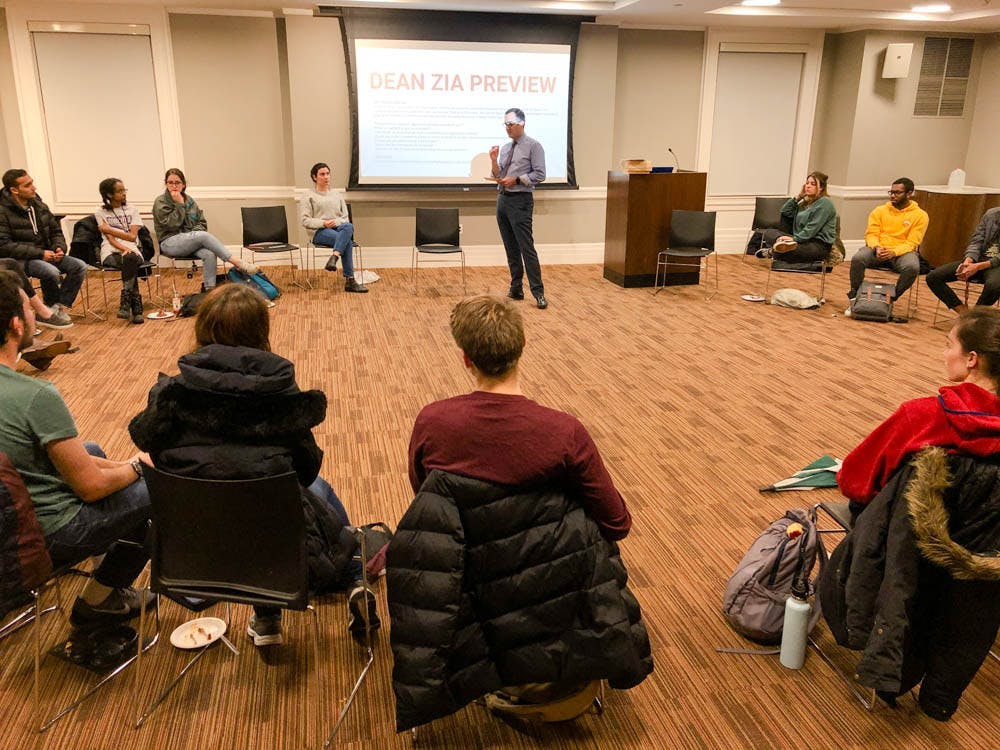The Undergraduate Council of Students gave feedback to Dean of the College Rashid Zia ’01 on the course pre-registration process and exam stress at its general body meeting Wednesday evening.
Zia spoke to the Council as part of the University’s effort to improve pre-registration through reforms guided by student feedback.
Shopping period is “meant to be a very empowering experience, but we know for students today that it can be a very stressful experience,” he said.
Pre-registration is valuable because it helps administrators assign classrooms to courses and enables students to get a better sense of their course load for the upcoming semester, Zia said. The University has long conducted pre-registration on a first-come, first-served basis staggered by class year, but it could restructure the process to “make sure every student has access and opportunity to get into courses,” Zia said.
“We can imagine hundreds of possible ways to do this, and they’re not good or bad approaches, they just preference different things,” he said.
Chair of Academic Affairs Livingstone Harriott ’20 suggested instituting a formal waitlist system for each course. Several general body members also noted that Courses@Brown does not consistently provide information about section requirements, enrollment caps and year restrictions, which inform how students choose their courses.
After Chair of Student Activities Alex Song ’20 said upperclassmen do not receive reminders about the timeline for pre-registration, Zia responded that a reminder notification will be sent to all students a day prior to their pre-registration period next semester.
Zia also solicited feedback from the general body on how to “lower the stakes” around exams in order to reduce stress and curb cheating.
In May, University faculty passed a motion to modify the charge of the Standing Committee on the Academic Code in light of increased violations, The Herald previously reported. Under the modified charge, the committee can consider rewriting the academic code and setting up a “low-stakes” adjudication process for code violations, Zia said.
Council members also reviewed an excerpt from the “Draft of a Working Paper for Education at Brown University,” the 1967 document proposing that the University adopt an open curriculum and make other changes to the undergraduate academic experience. The excerpt argued that tests “can serve as a learning experience in many ways.”
“It is my hope, if we do this right, that there may be some way to share this material with students so that it might help to address the stress and anxiety that comes around with tests,” Zia said, adding that he hopes tests can be framed around learning rather than grades.
But while general body members acknowledged the value of viewing tests as learning opportunities, several said students have different perspectives on tests.
“At some level, grades do matter,” said Appointments Co-Chair Eamon McKeever ’22.
General body members also gave feedback on other ways to reduce stress around exams, such as by encouraging first-years to take courses S/NC.
The goal of the conversation with UCS was to consider “how we can help navigate (grades) while still promoting learning,” Zia said.
“If we all believe that learning is the value of the campus, then we can use that as an anecdote to those moments when stress levels are high,” he added.
After the discussion, the Council debriefed on recommendations to provide Zia, with some general body members expressing uncertainty about tangible changes to improve pre-registration and test taking.
“Changing the narrative around tests seems really idealistic,” said UCS President William Zhou ’20.
Harriott said that based on his individual conversations with Zia, reducing stress around pre-registration is “definitely one of (the University’s) priorities.”
Before Zia spoke, Chief of Staff Melissa Lee ’20 announced that the Council will offer free shuttle rides to Boston Logan International Airport and T.F. Green Airport on the Tuesday and Wednesday before Thanksgiving break, continuing an initiative launched last Thanksgiving.
The Council also heard updates from Elections Board Co-Chairs Song and Mary Stack ’21.
To prepare for spring elections, Song and Stack told the Council that UCS will create a working group to evaluate and improve its election bylaws and processes. Any undergraduate student who is not considering running for a position on UCS, the Undergraduate Finance Board or the Class Coordinating Board is eligible to join the working group.
In addition, UCS, UFB and CCB will hold a leadership training on Sunday open to any member of student government at the University. UCS Vice President Jason Carroll ’21 also introduced a form that general body members can fill out if they are interested in starting new initiatives through the Council.





